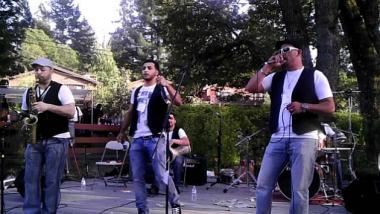
Gypsies, who prefer to be known as Roma or Romani, came from Northern India about 1,000 years ago and developed a musical presence that's blending with and is often mistaken for the music of the country in which they reside, called erroneously Hungarian or Romanian folk music.
"Pure" Roma music will be performed by the New York-based Sazet Band at an all-day affair in San Francisco on May 2 called the 18th Annual California Herdeljezi Balkan Romani Music Festival, a compendium of music and dance performances, workshops, and panel discussions.
Anthropologist Carol Silverman, one of the organizers, says Herdeljezi is the name for the Romani spring holiday of renewal and fertility, and the Balkan region has one of the greatest concentrations of the Roma ethnic group.
There are as many as a million Roma who live in the U.S., and the Bay Area is "a hot spot for Balkan Romani music," according to musician and teacher Sani Rifati, a Rom from Kosovo, festival organizer and one of the founders of the Voice of Roma organization.
Northern California, Rifati says, "hosts dozens of bands composed of non-Roma who rarely have the opportunity to hear and learn from real Roma. For two decades Voice of Roma has brought top quality Roma to its festival stages; this year Bay Area residents can learn the music and dance at a series of workshops and explore the music's Balkan contexts at a panel discussion."
Featured at the festival — in performance and at the closing dance party — is the Sazet Band, vocals by Ferdi Demir accompanied by clarinet, saxophone, keyboard, guitar, drums, and percussion.
Roma or Gypsy people are among the most persecuted ethnic groups in Europe. Thousands perished in Holocaust concentration camps, along with Jews and gays; in Central Europe, discrimination and persecution exist to the present day.
Silverman says the festival "seeks to renew interest and attention on the continued struggles of Romani people around the world, striving to counter negative Gypsy stereotypes and supporting efforts by Roma to rebuild and maintain their communities, improve their lives and strengthen their international voice and visibility."

